Form 8-K UNIVERSAL TECHNICAL INST For: Nov 29
UNITED STATES
SECURITIES AND EXCHANGE COMMISSION
WASHINGTON, D.C. 20549
FORM 8-K
CURRENT REPORT
Pursuant to Section 13 or 15(d) of the Securities Exchange Act of 1934
Date of Report (Date of Earliest Event Reported): | November 29, 2018 | |
Universal Technical Institute, Inc.
__________________________________________
(Exact name of registrant as specified in its charter)
Delaware | 1-31923 | 86-0226984 |
_____________________ (State or other jurisdiction | _____________ (Commission | ______________ (I.R.S. Employer |
of incorporation) | File Number) | Identification No.) |
16220 North Scottsdale Road, Suite 500, Scottsdale, Arizona | 85254 | |
_________________________________ (Address of principal executive offices) | ___________ (Zip Code) | |
Registrant’s telephone number, including area code: | 623-445-9500 | |
Not Applicable
______________________________________________
Former name or former address, if changed since last report
Check the appropriate box below if the Form 8-K filing is intended to simultaneously satisfy the filing obligation of the registrant under any of the following provisions:
[ ] Written communications pursuant to Rule 425 under the Securities Act (17 CFR 230.425)
[ ] Soliciting material pursuant to Rule 14a-12 under the Exchange Act (17 CFR 240.14a-12)
[ ] Pre-commencement communications pursuant to Rule 14d-2(b) under the Exchange Act (17 CFR 240.14d-2(b))
[ ] Pre-commencement communications pursuant to Rule 13e-4(c) under the Exchange Act (17 CFR 240.13e-4(c))
Indicate by check mark whether the registrant is an emerging growth company as defined in Rule 405 of the Securities Act of 1933 (§230.405 of this chapter) or Rule 12b-2 of the Securities Exchange Act of 1934 (§240.12b-2 of this chapter).
Emerging growth company ¨
If an emerging growth company, indicate by check mark if the registrant has elected not to use the extended transition period for complying with any new or revised financial accounting standards provided pursuant to Section 13(a) of the Exchange Act. ¨
Item 7.01 Regulation FD Disclosure.
We are furnishing this Current Report on Form 8-K in connection with the disclosure of information, in the form of the textual information from a presentation to be given at meetings with institutional investors or analysts. This information may be amended or updated at any time and from time to time through another Form 8-K, a later company filing, or other means. The presentation attached as Exhibit 99.1 to this Current Report on Form 8-K updates and replaces in its entirety all prior presentations filed by us, including the presentation filed as Exhibit 99.1 to the Current Report on Form 8-K dated February 8, 2018, which was filed with the Securities and Exchange Commission on February 8, 2018.
The information in this Current Report on Form 8-K (including the exhibit) is furnished pursuant to Item 7.01 and shall not be deemed to be “filed” for the purpose of Section 18 of the Securities Exchange Act of 1934, as amended, or otherwise subject to the liabilities of that section. This Current Report on Form 8-K will not be deemed an admission as to the materiality of any information in the Report that is required to be disclosed solely by Regulation FD.
We do not have, and expressly disclaim, any obligation to release publicly any updates or any changes in our expectations or any change in events, conditions, or circumstances on which any forward-looking statement is based.
The text included with this Report on Form 8-K is available on our website located at www.uti.investorroom.com, although we reserve the right to discontinue that availability at any time.
Item 9.01 Financial Statements and Exhibits.
(d) Exhibits
Exhibit No. | Description | |
Investor Presentation dated November 29, 2018 | ||
SIGNATURES
Pursuant to the requirements of the Securities Exchange Act of 1934, the registrant has duly caused this report to be signed on its behalf by the undersigned hereunto duly authorized.
Universal Technical Institute, Inc. | ||||
November 29, 2018 | By: | /s/ Scott Yessner | ||
Name: Scott Yessner | ||||
Title: Interim Chief Financial Officer | ||||

Investor Presentation November 29, 2018

Safe harbor This presentation may contain forward-looking statements regarding events or future financial performance. These statements are only predictions and the actual events or results may differ materially. For important factors that could cause actual results to differ materially from those contained in our forward-looking statements, please refer to the Company’s filings with the Securities and Exchange Commission. 22

Nation’s leading provider of skilled transportation technicians • 53 years of training technicians • 200,000+ graduates • 30+ leading manufacturer partners - BMW, Cummins, Ford, Harley-Davidson • 84% graduate employment rate1 • $317.0 million in revenue in fiscal 2018 • $58.1 million in cash & equivalents2 • NYSE: UTI 1UTI employment rate for 2017 graduates who were employed within one year of graduation was 84%. See UTI’s 10-K for additional information. For 2017, we had approximately 8,539 total graduates, of which approximately 8,086 were available for employment. Of those graduates available for employment, approximately 6,818 were employed within one year of their graduation date, for a total of 84%. 2September 30, 2018 3

A national campus network with capacity for expansion ESTABLISHED FOOTPRINT • 13 campuses in nine states • 2.32 million campus square feet Smaller campus format 4

Impressive training facilities Bloomfield, New Jersey campus 5

State-of-the-industry vehicles and technology Long Beach, California campus 6

More market share than our three closest competitors combined 14% UTI UTI Lincoln Tech graduates more 5% 2% UNOH (NFP) 59% 1% auto/diesel techs WyoTech (NFP) 9% than any other Other for-profit school in the country. 1% 9% Other not-for-profit 4-year colleges Community colleges Source: IPEDS, provisional 2017 completions data. Based on first major, completions for bachelor's degree, associate's degree, and certificates below the baccalaureate level for all Title IV institutions. Includes programs for auto mechanics, diesel mechanics and medium/heavy vehicle and truck technicians. 7

Partnerships with the world’s leading manufacturers 84% graduate employment rate* *UTI employment rate for 2017 graduates who were employed within one year of graduation was 84%. See UTI’s 10-K for additional information. For 2017, we had approximately 8,539 total graduates, of which approximately 8,086 were available for employment. Of those graduates available for employment, approximately 6,818 were employed within one year of their graduation date, for a total of 84%. 8

Delivering higher 10-year median earnings $55,000 46% $45,200 $45,712 increase $45,000 $30,915 $35,000 $25,000 Community UTI 1 Liberal arts colleges colleges Source: The College Scorecard. See Appendix for details and calculation methodology. UTI cannot guarantee employment or salary. 1 UTI of Arizona OPEID. 9

Demand for auto/diesel technicians far exceeds supply 100,000 50,000 new auto/diesel total auto/diesel technicians graduates needed in 2017 every year through 2026 SOURCES: BLS Employment Outlook Summary, October 2017. Includes new job growth and replacements. IPEDS, provisional 2017 postsecondary completions data. Based on first major, completions for bachelor's degree, associate's degree, and certificates below the baccalaureate level for all Title IV institutions. Includes programs 10 for auto mechanics, diesel mechanics and medium/heavy vehicle and truck technicians. .
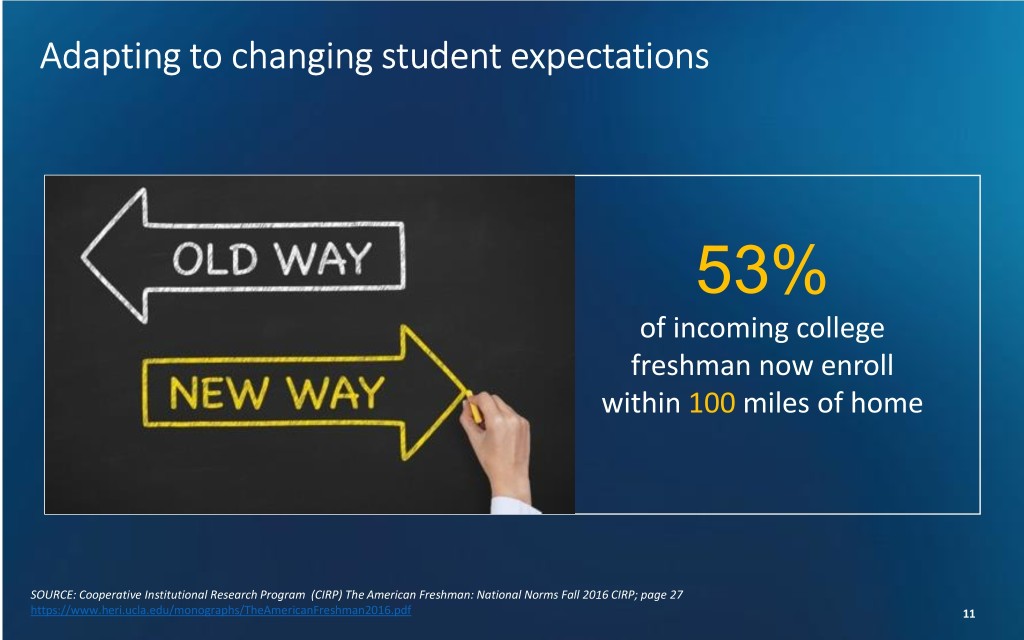
Adapting to changing student expectations 53% of incoming college freshman now enroll within 100 miles of home SOURCE: Cooperative Institutional Research Program (CIRP) The American Freshman: National Norms Fall 2016 CIRP; page 27 https://www.heri.ucla.edu/monographs/TheAmericanFreshman2016.pdf 11

Transitioning from destination to commuter campus model DALLAS 2010 LONG BEACH 2015 • 100-150K square feet, depending on program offerings • Average student capacity of 750 • ~$10-$15 million capital investment • Accretive to earnings in 18 months • Cumulative cash flow breakeven by year 4 12

New commuter campus – Bloomfield, New Jersey • Capital investment of $9.2m (a) • ~$6m of EBITDA loss in year 1 • Accretive to earnings in 18 months • Cash flow break even by year 4 • IRR 35%+ State-of-the-industry training facility 108,000 square feet Auto, diesel and manufacturer-specific training Opened August 2018 See Appendix for Bloomfield, NJ Pro-Forma (a) The capital investment is net of tenant improvement allowances 13

Right-sizing destination campuses for efficiency Add new Divest real Sub-lease 1 Enhance utilization programs estate space of existing space AVONDALE, AZ Welding FY18 with new programs PHOENIX, AZ FY17 2 Review RANCHO CUCAMONGA, CA Welding FY17 FY18 opportunities to SACRAMENTO, CA FY18 divest real estate ORLANDO, FL and/or not renew LISLE, IL FY17-18 leases NORWOOD, MA FY17 3 Explore subleasing MOORESVILLE, NC CNC FY17 options for existing EXTON, PA capacity HOUSTON, TX FY18 = Current initiative; relevant dates not yet finalized 14

Adding new, differentiated program offerings WELDING CNC MACHINING • High demand for technicians • High demand for technicians • 36-wk program in Rancho Cucamonga, CA & Avondale, AZ • 36-week program at NASCAR Technical Institute • Intend to expand to Dallas, TX in Q2 2019 • Only CNC school affiliated with Roush Yates & NASCAR Create pipeline of prospective students Utilize excess capacity Improve business unit economics See appendix for on Welding program relative cash flows Drive growth 15

Evolving strategy to better reach and engage students HighHIGH SCHOOLschool GRADSgrads Veterans AdultADULT LEARNERSlearners Growing Declining Stabilizing 51% 9% 40% Field team visits schools to generate Field team visits bases to help Optimizing traditional and digital interest and help students apply; transitioning soldiers; dedicated teams advertising to generate inquiries, served working to overcome “college for all” assist veterans; decline due to base by campus–based reps; mentality; improving sentiment toward access issues and re-enlistment declining enrollment due to a strong job skilled trades incentives; working to regain access market is beginning to stabilize 16
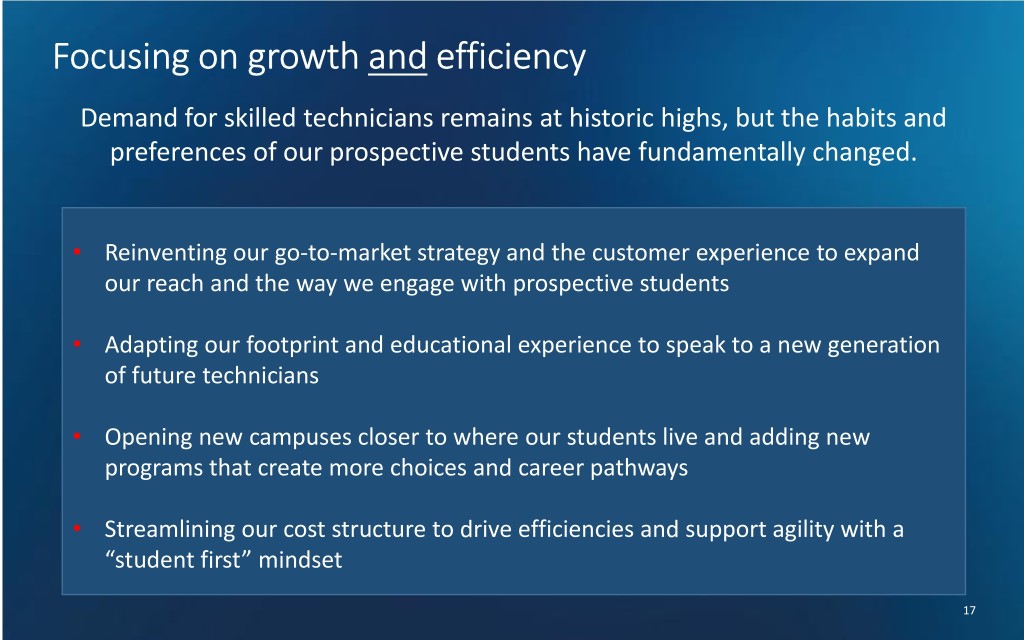
Focusing on growth and efficiency Demand for skilled technicians remains at historic highs, but the habits and preferences of our prospective students have fundamentally changed. • Reinventing our go-to-market strategy and the customer experience to expand our reach and the way we engage with prospective students • Adapting our footprint and educational experience to speak to a new generation of future technicians • Opening new campuses closer to where our students live and adding new programs that create more choices and career pathways • Streamlining our cost structure to drive efficiencies and support agility with a “student first” mindset 17

Stabilizing the business and investing for growth 2016 – recapitalized our business to enable our future growth strategy 2017 – implemented our Financial Improvement Plan to drive cost efficiencies 2018 Highlights: • focused on strategic investments in marketing and admissions, retention and student services • new student starts for fiscal 2018 were up 1.2% compared to 2017, marking the first time for new student start growth in eight years • opened Bloomfield, New Jersey campus which contributed to 8.5% increase in the total number of students who started school in the fourth quarter compared to the prior year fourth quarter • rationalized our real estate footprint and costs to support more profitable operations and better serve our students 18
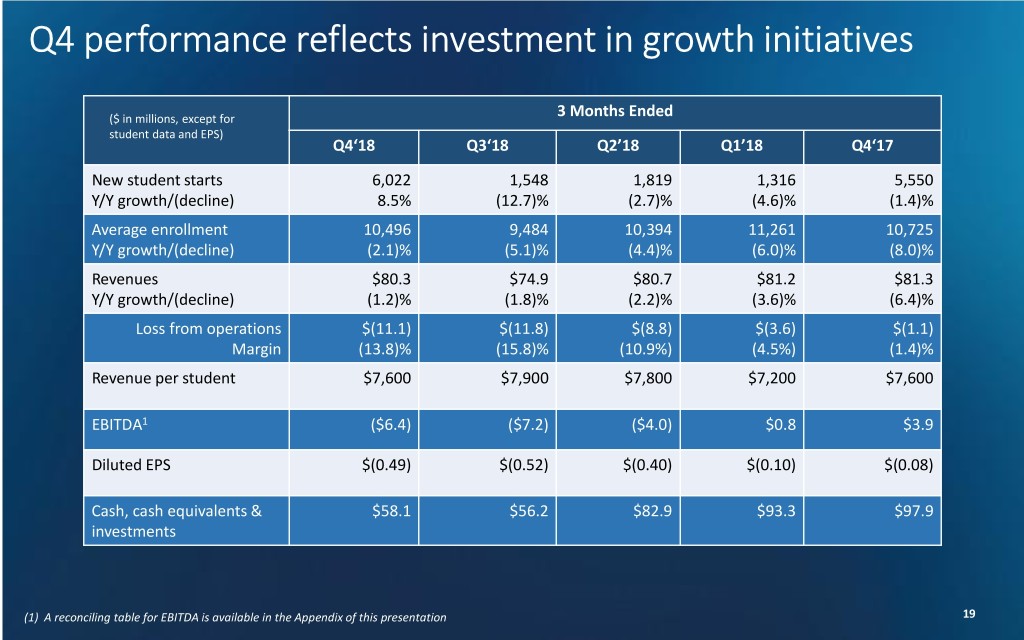
Q4 performance reflects investment in growth initiatives ($ in millions, except for 3 Months Ended student data and EPS) Q4‘18 Q3‘18 Q2’18 Q1’18 Q4‘17 New student starts 6,022 1,548 1,819 1,316 5,550 Y/Y growth/(decline) 8.5% (12.7)% (2.7)% (4.6)% (1.4)% Average enrollment 10,496 9,484 10,394 11,261 10,725 Y/Y growth/(decline) (2.1)% (5.1)% (4.4)% (6.0)% (8.0)% Revenues $80.3 $74.9 $80.7 $81.2 $81.3 Y/Y growth/(decline) (1.2)% (1.8)% (2.2)% (3.6)% (6.4)% Loss from operations $(11.1) $(11.8) $(8.8) $(3.6) $(1.1) Margin (13.8)% (15.8)% (10.9%) (4.5%) (1.4)% Revenue per student $7,600 $7,900 $7,800 $7,200 $7,600 EBITDA1 ($6.4) ($7.2) ($4.0) $0.8 $3.9 Diluted EPS $(0.49) $(0.52) $(0.40) $(0.10) $(0.08) Cash, cash equivalents & $58.1 $56.2 $82.9 $93.3 $97.9 investments (1) A reconciling table for EBITDA is available in the Appendix of this presentation 19
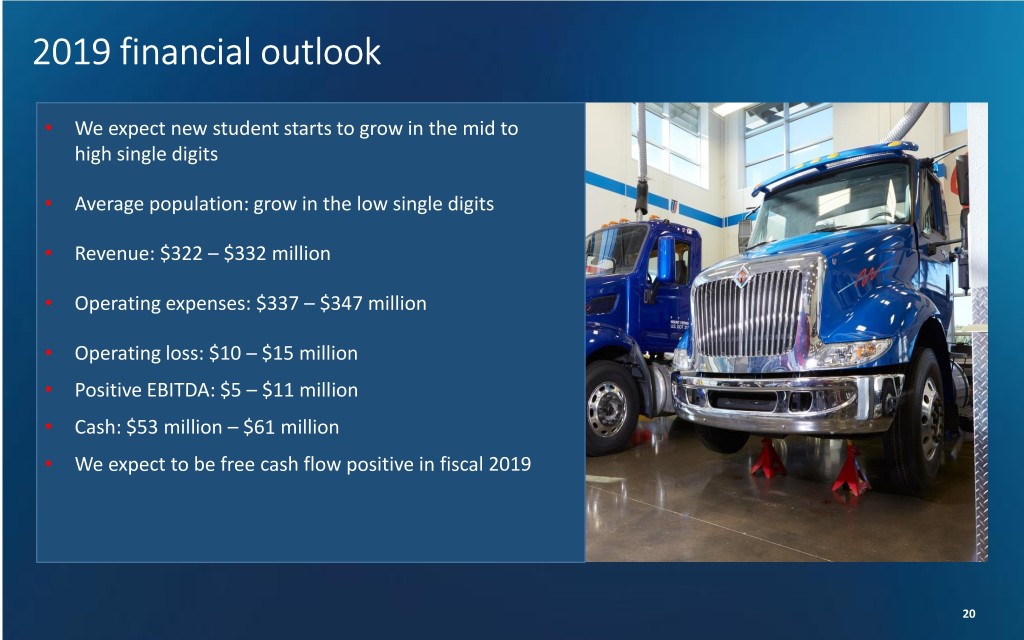
2019 financial outlook • We expect new student starts to grow in the mid to high single digits • Average population: grow in the low single digits • Revenue: $322 – $332 million • Operating expenses: $337 – $347 million • Operating loss: $10 – $15 million • Positive EBITDA: $5 – $11 million • Cash: $53 million – $61 million • We expect to be free cash flow positive in fiscal 2019 20

Why invest in UTI Strong and growing end-market demand Leader in transportation technician training Industry partnerships that create competitive advantage Attractive student value proposition Business is growing; projected average student population growth in FY19 Strong balance sheet Investing in strengths to drive growth Well-positioned and optimized for counter cycle 21

Appendix
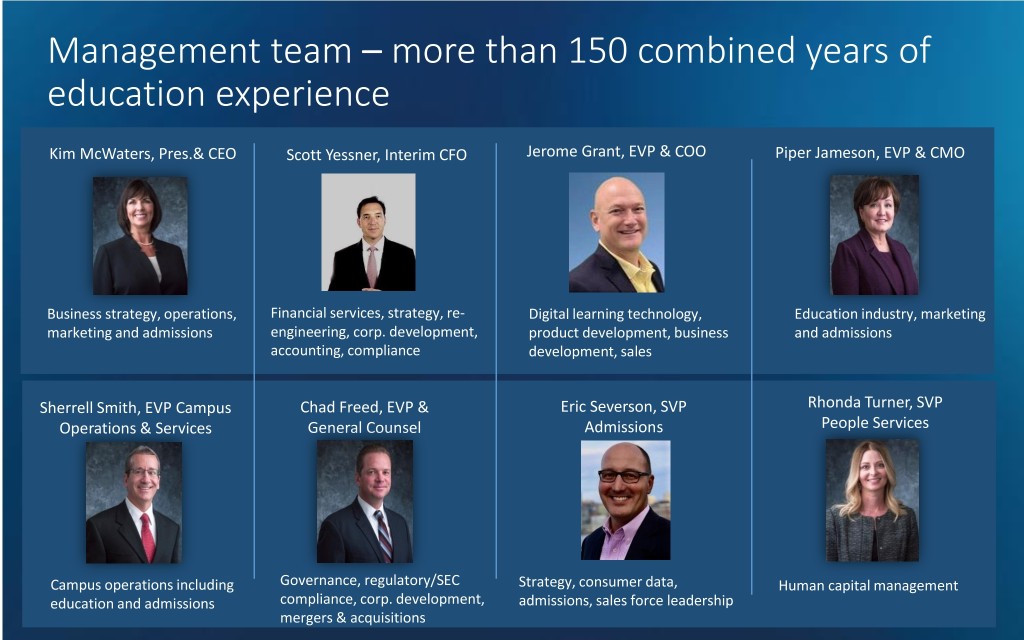
Management team – more than 150 combined years of education experience Kim McWaters, Pres.& CEO Scott Yessner, Interim CFO Jerome Grant, EVP & COO Piper Jameson, EVP & CMO Business strategy, operations, Financial services, strategy, re- Digital learning technology, Education industry, marketing marketing and admissions engineering, corp. development, product development, business and admissions accounting, compliance development, sales Sherrell Smith, EVP Campus Chad Freed, EVP & Eric Severson, SVP Rhonda Turner, SVP Operations & Services General Counsel Admissions People Services Campus operations including Governance, regulatory/SEC Strategy, consumer data, Human capital management education and admissions compliance, corp. development, admissions, sales force leadership mergers & acquisitions 23

A highly qualified Board of Directors Robert DeVincenzi Kimberly McWaters David Blaszkiewicz Non-Executive Chairman, President and Chief Executive President and Chief Universal Technical Institute; Officer, Universal Technical Executive Officer, Principal, Lupine Ventures; Institute Invest Detroit Former President and CEO of Redflex Holdings Ltd. Roderick Paige Conrad A. Conrad William J. Lennox, Jr. Former U.S. Former Executive Vice Former Superintendent of Secretary of President and Chief the United States Military Education; Interim Financial Officer, The Academy at West Point; President, Jackson Dial Corporation President, Saint Leo State University University Linda J. Srere Roger S. Penske Chris Shackelton Former President, Chairman, Penske Managing Partner, Automotive Group, Young and Rubicam Coliseum Capital Advertising Inc. Management Kenneth R. Trammell John C. White Chief Financial Officer, Former Chairman, Universal Tenneco Inc. Technical Institute, Inc.; Founder, Motorcycle Mechanics Institute 24
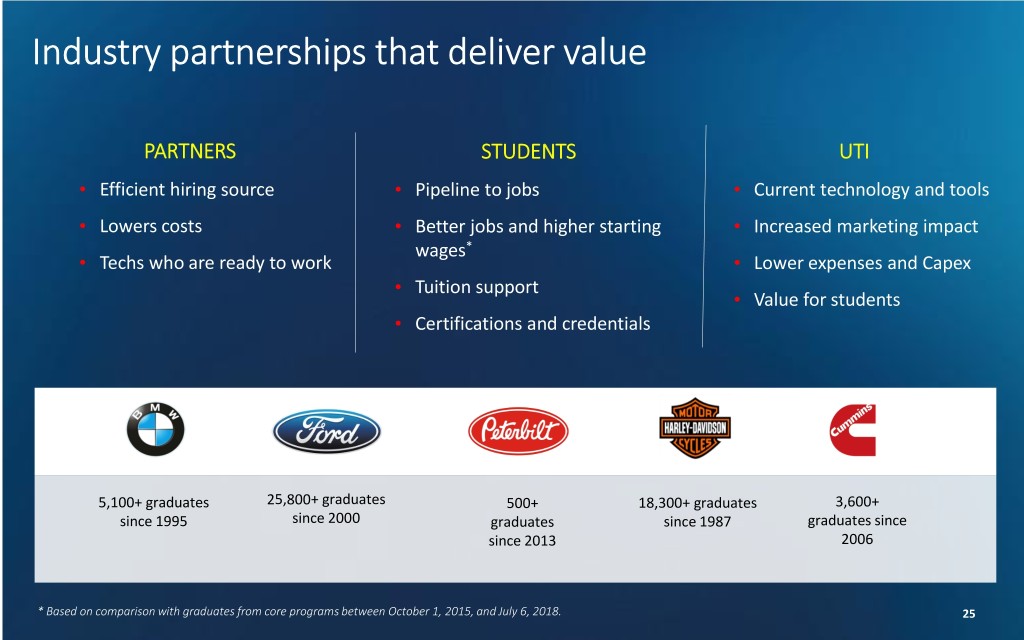
Industry partnerships that deliver value PARTNERS STUDENTS UTI • Efficient hiring source • Pipeline to jobs • Current technology and tools • Lowers costs • Better jobs and higher starting • Increased marketing impact wages* • Techs who are ready to work • Lower expenses and Capex • Tuition support • Value for students • Certifications and credentials 5,100+ graduates 25,800+ graduates 500+ 18,300+ graduates 3,600+ since 1995 since 2000 graduates since 1987 graduates since since 2013 2006 * Based on comparison with graduates from core programs between October 1, 2015, and July 6, 2018. 25
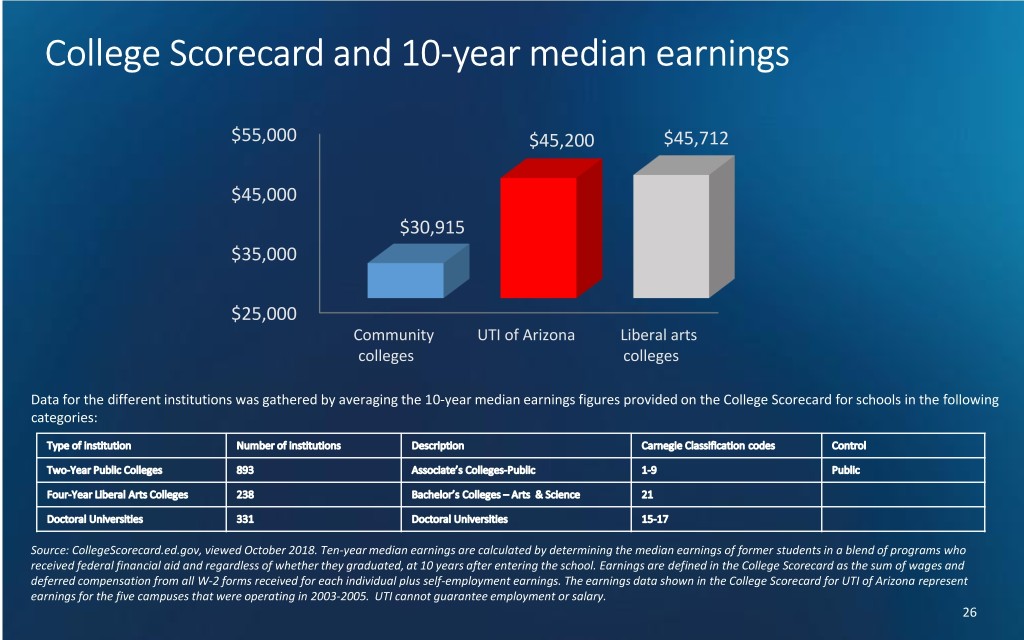
College Scorecard and 10-year median earnings $55,000 $45,200 $45,712 $45,000 $30,915 $35,000 $25,000 Community UTI of Arizona Liberal arts colleges colleges Data for the different institutions was gathered by averaging the 10-year median earnings figures provided on the College Scorecard for schools in the following categories: Source: CollegeScorecard.ed.gov, viewed October 2018. Ten-year median earnings are calculated by determining the median earnings of former students in a blend of programs who received federal financial aid and regardless of whether they graduated, at 10 years after entering the school. Earnings are defined in the College Scorecard as the sum of wages and deferred compensation from all W-2 forms received for each individual plus self-employment earnings. The earnings data shown in the College Scorecard for UTI of Arizona represent earnings for the five campuses that were operating in 2003-2005. UTI cannot guarantee employment or salary. 26

A long history of entering and executing in new markets PHILADELPHIA MARKET ENTRY(a) DALLAS/FORT WORTH MARKET ENTRY(b) 1200 650 600 1000 550 800 500 450 600 400 Completions Completions 400 350 300 200 250 0 200 2005 2006 2007 2008 2009 2010 2011 2012 2013 2014 2015 2016-Prelim UTI Competitor UTI Competitor (a) Total completions for UTI-Exton versus Lincoln-Philadelphia. Includes all certificates below the baccalaureate level and associate’s degrees for automotive and diesel programs. Source is IPEDS . (b) Total completions for UTI-Dallas versus Lincoln-Grand Prairie. Includes all certificates below the baccalaureate level and associate’s degrees for automotive , collision and diesel programs. Source is IPEDS. UTI’s Dallas campus opened in 2010. 27
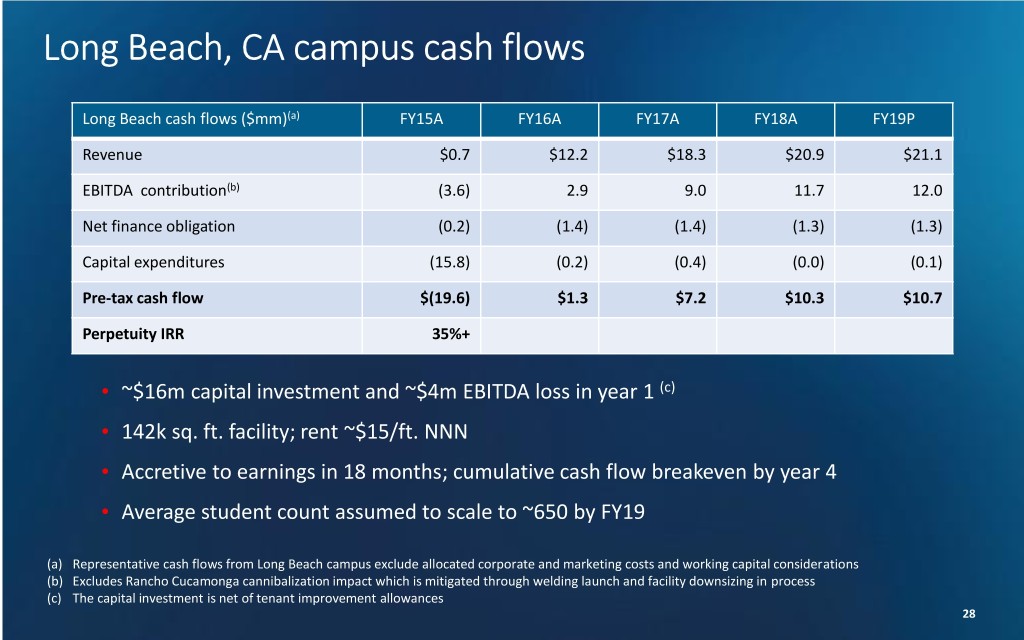
Long Beach, CA campus cash flows Long Beach cash flows ($mm)(a) FY15A FY16A FY17A FY18A FY19P Revenue $0.7 $12.2 $18.3 $20.9 $21.1 EBITDA contribution(b) (3.6) 2.9 9.0 11.7 12.0 Net finance obligation (0.2) (1.4) (1.4) (1.3) (1.3) Capital expenditures (15.8) (0.2) (0.4) (0.0) (0.1) Pre-tax cash flow $(19.6) $1.3 $7.2 $10.3 $10.7 Perpetuity IRR 35%+ • ~$16m capital investment and ~$4m EBITDA loss in year 1 (c) • 142k sq. ft. facility; rent ~$15/ft. NNN • Accretive to earnings in 18 months; cumulative cash flow breakeven by year 4 • Average student count assumed to scale to ~650 by FY19 (a) Representative cash flows from Long Beach campus exclude allocated corporate and marketing costs and working capital considerations (b) Excludes Rancho Cucamonga cannibalization impact which is mitigated through welding launch and facility downsizing in process (c) The capital investment is net of tenant improvement allowances 28

Bloomfield, NJ campus cash flows NJ pro-forma cash flows ($mm)(a) FY18A FY19P FY20P FY21P FY22P Revenue $0.6 $11.5 $17.8 $19.2 $19.7 EBITDA contribution(b) (4.9) 3.1 8.8 9.5 9.6 Capital expenditures(c) (9.2) (0.4) (0.1) (0.2) (0.2) Pre-tax cash flow $(19.3) $2.7 $8.7 $9.3 $9.4 Perpetuity IRR 35%+ • ~$9.2m capital investment and ~$5m of EBITDA loss in year 1 (c) • 108k sq. ft. facility; rent ~$14/ft. • Accretive to earnings in 18 months; cumulative cash flow breakeven by year 4 • Average student count assumed to scale to ~650 by FY22 (a) Representative cash flows from Bloomfield campus exclude allocated corporate and marketing costs and working capital considerations (b) Excludes potential cannibalization to Exton, PA campus and planned offsetting efforts to remediate impact (c) The capital investment is net of tenant improvement allowances 29

Avondale Welding program cash flows Welding pro-forma cash flows ($mm)(a) FY17A FY18A FY19P FY20P FY21P Revenue $0.0 $1.2 $2.7 $2.6 $2.9 EBITDA contribution(b) (0.1) 0.5 1.8 1.7 1.9 Capital expenditures(c) (0.4) 1.1 0.0 0.0 0.0 Pre-tax cash flow $(0.5) $1.6 $1.8 $1.8 $1.9 Perpetuity IRR 80%+ • 1st program opened at Rancho Cucamonga campus in FY17Q4; first class graduated 2/1/18 • 2nd program opened at Avondale campus in 1/18/18 • 3rd program intended to open at DFW in FY19Q2; pursuing regulatory approvals (a) Representative pro-forma cash flows for UTI’s Welding program launched at the Avondale campus in January 2018 (b) EBITDA contribution includes targeted marketing investments and support related to the Avondale Welding, but excludes allocated corporate overhead and working capital considerations (c) Includes capitalized curriculum development 30

Statement of loss ($ in thousands, except per share amounts) 3 Mos. 3 Mos. 3 Mos. 3 Mos. 3 Mos. 9/30/18 6/30/18 3/31/18 12/31/17 9/30/17 Revenues $ 80,256 $ 74,890 $ 80,663 $ 81,156 $ 81,329 Operating expenses: Educational services & facilities 47,954 44,737 45,817 44,081 44,919 Selling, general & administrative 43,353 41,953 43,666 40,679 37,524 Total operating expenses 91,307 86,690 89,483 84,760 82,443 Loss from operations (11,051) (11,800) (8,820) (3,604) (1,114) Total other income (expense), net 59 (71) (50) (360) 32 Income tax expense (benefit) 9 (158) (37) (2,829) (325) Net loss $ (11,001) $ (11,713) $ (8,833) $ (1,135) $ (757) Preferred stock dividends 1,323 1,309 1,295 1,323 1,323 Loss available for distribution $ (12,324) $ (13,022) $ (10,128) $ (2,458) $ (2,080) Net loss per share, basic & diluted $ (0.49) $ (0.52) $ (0.40) $ (0.10) $ (0.08) EBITDA(1) $ (6,361) $ (7,205) $ (4,015) $ 843 $ 3,850 (1) A reconciling table for EBITDA is available in the Appendix of this presentation 31

Balance sheet summary ($ in thousands) At: 9/30/18 9/30/17 Cash & cash equivalents/investments $58,104 $97,917 Restricted cash* 14,055 14,822 • On June 24, 2016, UTI raised $70 million through Current assets 116,795 146,826 the sale of Series A Convertible Preferred Stock to Coliseum Holdings Total assets $282,278 $274,102 • The proceeds are being used to fund strategic long- term growth initiatives: Current liabilities 92,462 86,389 - Strategic transformation of marketing, admissions and student support strategies Total liabilities 155,633 148,326 - Smaller campus strategy - New programs in existing markets with under- utilized campus facilities (Welding and CNC Stockholders’ equity 126,645 125,776 Machining) Total liabilities & stockholders’ equity $282,278 $274,102 * Restricted cash includes the funds transferred in advance of loan purchases under UTI’s proprietary loan program, funds held for students from Title IV financial aid program funds that result in credit balances on a student’s account and funds held as collateral for certain of the surety bonds that UTI’s insurers issue on behalf of UTI campuses and admissions representatives with multiple states, which are required to maintain authorization to conduct UTI’s business. 32

Use of Non-GAAP financial information This presentation contains non-GAAP (Generally Accepted Accounting Principles) financial measures, which are intended to supplement, but not substitute for, the most directly comparable GAAP measures. Management chooses to disclose to investors these non-GAAP financial measures because they provide an additional analytical tool to clarify the results from operations and help to identify underlying trends. Additionally, such measures help compare the company's performance on a consistent basis across time periods. Management also utilizes EBITDA and free cash flows as performance measures internally. To obtain a complete understanding of the company's performance, these measures should be examined in connection with net income (loss) and net cash provided by (used in) operating activities, determined in accordance with GAAP, as presented in the financial statements and notes thereto included in the annual and quarterly filings with the Securities and Exchange Commission. Since the items excluded from these measures are significant components in understanding and assessing financial performance under GAAP, these measures should not be considered to be an alternative to net income (loss) or net cash provided by (used in) operating activities as a measure of the company's operating performance or profitability. Exclusion of items in the non-GAAP presentation should not be construed as an inference that these items are unusual, infrequent or non- recurring. Other companies, including other companies in the education industry, may calculate non-GAAP financial measures differently than UTI does, limiting their usefulness as a comparative measure across companies. A reconciliation of the historical non-GAAP financial measures to the most directly comparable GAAP measures is included in the following slide. Information reconciling forward-looking EBITDA and free cash flow to the most directly comparable GAAP financial measure is unavailable to the company without unreasonable effort. The company is not able to provide a quantitative reconciliation of EBITDA or free cash flow to the most directly comparable GAAP financial measure because certain items required for such reconciliation are uncertain, outside of the company’s control and/or cannot be reasonably predicted, such as the provision for (benefit from) income taxes. Preparation of such reconciliation would require a forward-looking statement of income prepared in accordance with GAAP, and such forward-looking financial statements are unavailable to the company without unreasonable effort. 33

EBITDA reconciliation ($ in thousands) 3 Mos. 3 Mos. 3 Mos. 3 Mos. 3 Mos. 9/30/18 6/30/18 3/31/18 12/31/17 9/30/17 Net loss $ (11,001) $ (11,713) $ (8,833) $ (1,135) $ (757) Interest expense, net 480 474 500 431 461 Income tax expense (benefit) 9 (158) (37) (2,829) (325) Depreciation and amortization 4,151 4,192 4,355 4,376 4,471 EBITDA $ (6,361) $ (7,205) $ (4,015) $ 843 $ 3,850 34
